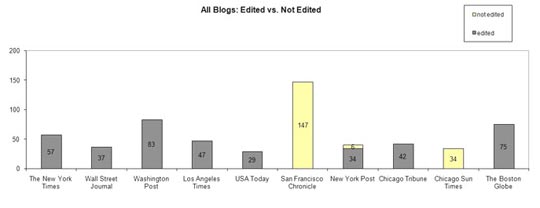Having a job in mainstream media before the age of 25 is fanciful thinking for many aspiring journalists, but having a blog could help turn those dreams into a reality.
Just ask young journalists Josh Halliday of the Guardian, Dave Lee of the BBC and Conrad Quilty-Harper of the Telegraph, all of whom credit their blogs as being fundamental to their success.
Speaking at an event at City University London last night, Halliday, a technology and media reporter and Sunderland University graduate, said: “The most important thing I did at university, including my degree, was to blog and get online. That’s what got me the job.”
Lee, who also started blogging while doing his undergraduate degree at Lincoln University, echoed Halliday saying: “I credit everything I’ve got to my blog at university.
“There is no possible way that I would have been able to go into the BBC newsroom on the basis of my degree, or the basis of my freelance cuttings or the basis of my student newspaper. ”
While Quilty-Harper, a data mapping journalist, said having a good blog and presence on Twitter, which he could readily show to potential employers, was what got him his job after he finished his postgraduate degree at City University London.
The three online trailblazers yesterday revealed their experiences of how to “blog your way into a job”:
Build a brand
Using your blog to promote yourself correctly is essential. Halliday stressed the importance of “being yourself” and marketing yourself in a way that is “likable”. While Lee highlighted that you never know what part of your branding will be the most fruitful, so you must do it all.
Conversing, linking and networking
Linked to the above is the idea that you must be in active dialogue with as many people as possible to build a dedicated following. Part of this involves linking to people who are blogging about similar topics to you, to create a mutually beneficial relationship. However, do not forget that, as Halliday highlighted, it’s a “two-way street”. So don’t just push yourself, relationships – especially ones with journalists already in the industry – should develop organically. Use the net’s networks appropriately.
Be patient
You won’t go from 20 to 5,000 twitter followers overnight. Cultivating a twitter following and developing a community takes time, so don’t get too caught up on this. Make content the driving force behind your website or blog and the community will come.
Find a niche
With an increasing amount of people entering the blogosphere standing out is harder than ever before, but what could really help is finding a topic that nobody else or very few people are writing about. Lee blogged about his experiences of being a student in the developing online media using himself as a “case study”; Halliday created a hyperlocal blog about Sunderland; and Quilty-Harper had a blog about gadgets and technology. All three were unanimously behind blogs having a niche, as Halliday highlighted “journalists are paid to cover a single beat, so just do that”.
Advertising
Increasing traffic to your site is one of the most difficult elements of blogging, but all three panellists deplored the idea of buying advertising space to this end declaring it a waste of money. Instead they advocated networking and conversing with the right people as the means by which to increase your popularity.
Rajvir Rai is a postgraduate journalism student at City University London. He can found on Twitter @R_Rai.
